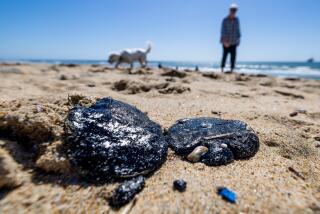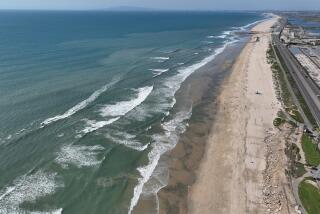Tanker’s Oil Goes Ashore Outside Sound
- Share via
VALDEZ, Alaska — Taffy-like tar mixed with seaweed was scoured off a beach Tuesday at the end of picturesque Resurrection Bay near Seward, the first town outside Prince William Sound to have oil wash up on its shores.
High tides and southerly wind off the Gulf of Alaska pushed the crude oil up the fjord-like channel, where two Coast Guard oil-skimming ships were out of action because the goo gummed up their pumps, Deputy Seward City Manager Darryl Schaefermeyer said.
“We put protective booming up around the critical (salmon) spawning streams in the bay four weeks ago,” Schaefermeyer said. “But as far as the rest of the bay, there was no effective way of booming it all off.”
The Coast Guard reported fresh sightings of oil on remote beaches on the Kenai Peninsula. A Valdez center for cleaning oil-fouled birds said at least 1,850 birds had died from the spill, along with 328 sea otters. The center has cleaned and released 22 birds.
Resurrection Bay, with a channel 600 feet deep, is about 125 air miles from where the tanker Exxon Valdez ran aground March 24, dumping more than 10 million gallons of Alaska crude oil into Prince William Sound.
Reservations Expressed
Adm. Paul Yost, the Coast Guard chief, approved Exxon’s cleanup plan for the sound Monday, but expressed reservations about whether it could succeed.
Lawrence Rawl, chairman of Exxon Corp., reacted angrily Tuesday. At a news conference in New York, he said he was confident that most of the beaches and rocks would be clean by mid-September.
“Now I’m not going to tell you that if you go up there a year from now you won’t find some black places on some rocks, but we’re going to make every effort to get it off,” he said. “I am telling you that a year from now the toxicity will be eliminated.”
Meanwhile, in an interview with Fortune magazine, Rawl acknowledged that it was “bad judgment” for Exxon to allow a captain with a known drinking problem to command the tanker responsible for the disastrous spill.
“Someone in management should have been notified” when Capt. Joseph Hazelwood took his first drink after being treated for alcoholism in 1985, Rawl said. “Our policy would not have permitted this man back on the ship,” he said.
“There’s no question that there was bad judgment involved in even putting a person with a critical skill back in that kind of work. It is pretty clear we have to tighten those things up,” he said.
More to Read
Sign up for Essential California
The most important California stories and recommendations in your inbox every morning.
You may occasionally receive promotional content from the Los Angeles Times.










